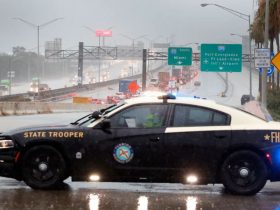There are individuals who have an extra $100 to spare, while others do not. This discrepancy can have significant implications for motorists who drive at the same speeds on Delaware’s roads.
Under a recently enacted law, which permits the use of residential speed cameras in the state, vehicle owners who have sufficient funds can conveniently settle their photo radar tickets from home, resolving the matter within minutes. On the other hand, vehicle owners who live paycheck to paycheck may endure months or even years of hardship.
The shock sets in when they receive their mail. For instance, if they are caught driving at 41 mph in a 30 mph zone, their fines and fees for a first offense could exceed $100 if they go to court and lose. If they are unable to promptly pay the amount, the government will suspend their driver’s license.
This suspension is enforced without exceptions or inquiries. The law mandates this action, and courts may also opt for the denial of vehicle registration or renewal for the owner.
Consequently, Delaware families facing financial distress can find themselves trapped in a cycle of debt. Without transportation, breadwinners are unable to work, take their children to daycare, or accompany their elderly parents to medical appointments. Ironically, they also face challenges attending court hearings, which can lead to further trouble.
While it is important to enforce laws against speeding, Delaware’s penalties extend beyond the realm of traffic violations. If that were not the case, all motorists would face similar consequences for comparable infractions. However, losing the ability to drive—which essentially means losing the ability to earn an honest living—is a penalty reserved solely for the poor.
The underlying offense for these individuals is not speeding; it is poverty.
Delaware took measures to address this disproportionate justice in 2022. One significant step was the passage of House Bill 244, which eliminated driver’s license suspensions for failure to pay court debts.
Since 2017, at least 22 other states and Washington, D.C. have enacted similar laws to end suspensions based on debt, with some jurisdictions going even further.
For instance, individuals who receive traffic tickets in San Francisco County have the option to request an ability-to-pay hearing and potentially have their fines and fees reduced by up to 80 percent. Defendants can also substitute community service for monetary payment.
In San Francisco, motorists face consequences for violating traffic laws, but the punishment aligns with the offense and does not leave families destitute.
However, Delaware has chosen a different path, backtracking on its reforms from the previous year. This policy shift is risky, especially considering the tendency of some agencies to abuse fines and fees.
In 2021, our public interest law firm, the Institute for Justice, filed a lawsuit against Wilmington on behalf of vehicle owners trapped in a predatory parking enforcement scheme.
Wilmington consistently issued tickets to Ameera Shaheed for legally parked vehicles. While she appealed these tickets, the city towed her car and demanded full payment.
Shaheed, a disabled grandmother of three, could not afford to settle her $320 debt within 30 days, resulting in her car being scrapped by the tow company.
Stories like this are common in Wilmington. Now, envision the potential impact when financially strained cities and towns gain access to photo radar—a potentially more lucrative source of revenue.
The new law promises impartial traffic enforcement. The unblinking cameras installed on poles and trailers throughout the state will treat all motorists equally, with the exception of emergency responders who enjoy special immunity.
Everyone else must adhere to the rules. These speed cameras will not discriminate based on age, gender, race, or religion.
At first glance, this may appear fair. However, a one-size-fits-all approach to fines and fees disproportionately burdens the poor. Suspending anyone’s license for reasons unrelated to public safety is abuse, especially when the government employs it as leverage to collect debts.
Delaware acknowledged this in 2022, but now the state is reversing its progress.












Leave a Reply